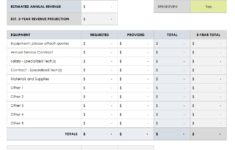Starting your business can be a challenging prospect. However, with a financial plan, it is not as difficult as all that. If you plan a Startup Budget, it is all going to eventually fall into place. Although, paying monthly salaries in the beginning is a daunting task, you can accomplish a lot more with a planned budget for your start-up.
A Startup Budget will work as a roadmap for your business. A Startup Budget can be of various kinds. Therefore, it is essential to create a plan for your business specifically. For a startup venture, it is essential to know how much money is available, how much money needs to be spent, and how much revenue needs to be generated so that you can achieve your business goals. A start-up budget is usually a crucial component of a business plan. It can come in handy when you want to apply for a loan or when you pitch to investors.
Start Up Business Budget Template
Refer to your budget before you make expenditures crucial to the business. This will tell you whether or not you can afford to do so. Important business decisions like buying new machinery or expanding your operations should ideally be made only after referring to your budget and making sure you can afford to spend that money.
Before you start a business, you must consider the startup costs so that there is enough cash to start business operations at the appointed time and within the stipulated budget. A Startup Budget should ideally cover the time leading up to the beginning of operations. Include only those costs that are essential to start your business. You can also use this budget to figure out areas where you can save money.
Startup costs are of two types, monthly costs and one-time costs. Monthly costs are expenses that are a monthly affair and have to be paid every month like salaries to employees, utilities, and lease payments. One-time costs are expenses that happen only once in the startup period. For example, purchase of computer equipment, a building, and consultant fees are included in this category.
You must have a financial plan for the short as well as the long-term. This way you will be able to control the cash flow of the business more efficiently. Make a short-term financial plan which includes month to month expenditures. Make another plan for the long-term with quarter to quarter expenditure of your firm over three to four years. This will help in financial statement reporting and should be ready two months before the end of the fiscal year. Remember to update your long-term plan once your short-term plan is ready.
A Startup Budget should include your costs, revenues and your profits. Your profit is your cash flow. Keeping a tab on your cash flow is essential so that you know whether you have money to make capital improvements or expenses. Consult a good accountant for preparing your Startup Budget. Alternately, you can do it yourself with small business financial software, if you want to save money.
Preview and Download Start Up Budget Template


